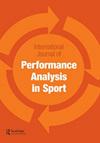The temporal structure of male’s Olympic boxing matches in flyweight, middleweight and super heavyweight categories: a pilot study
IF 1.6
4区 教育学
Q1 Health Professions
International Journal of Performance Analysis in Sport
Pub Date : 2023-05-01
DOI:10.1080/24748668.2023.2207370
引用次数: 0
Abstract
ABSTRACT The objective of this research was to define the temporal structure of Olympic boxing in males in the flyweight, middleweight and super heavyweight categories. The participants were boxers of the stated categories, who competed in the Tokyo 2020 Olympic Games. Using observational methodology, we analysed all the matches in these categories from the round of 16 (n = 45). To obtain the results, we used different analysis techniques with SPSS: descriptive analysis, Shapiro-Wilk, one-factor ANOVA, Kruskal–Wallis test and chi-square. The significance level used was p < 0.05. The results define the time structure models for each of the weight categories in the three rounds of combat. With these models, coaches and sport technicians will be able to establish the optimal training loads for their athletes. We found significant differences in the total number of punches and in the ring area where the punches were made, resulting in the flyweight category being where most actions are taken in both cases. In the three weight categories, the differences among the three rounds are minimal. We conclude that most of the combats end in the third round, consuming the total fighting time in the three weight categories.男子奥运拳击比赛中蝇量级、中量级和超重量级比赛时间结构的初步研究
摘要本研究的目的是确定男子奥运拳击在蝇量级、中量级和超重量级比赛中的时间结构。参与者是参加2020年东京奥运会的上述类别的拳击手。使用观察方法,我们分析了第16轮(n = 45)。为了获得结果,我们使用了不同的SPSS分析技术:描述性分析、Shapiro-Wilk、单因素方差分析、Kruskal-Wallis检验和卡方检验。使用的显著性水平为p < 0.05。结果定义了三轮战斗中每个重量类别的时间结构模型。有了这些模型,教练和体育技术人员将能够为他们的运动员建立最佳的训练负荷。我们发现,冲头的总数和冲头所在的环形区域存在显著差异,导致在这两种情况下,飞锤类是采取大多数动作的地方。在三个权重类别中,三轮之间的差异最小。我们得出的结论是,大多数战斗都在第三轮结束,消耗了三个重量类别的总战斗时间。
本文章由计算机程序翻译,如有差异,请以英文原文为准。
求助全文
约1分钟内获得全文
求助全文
来源期刊

International Journal of Performance Analysis in Sport
SPORT SCIENCES-
CiteScore
4.70
自引率
4.80%
发文量
38
审稿时长
>12 weeks
期刊介绍:
The International Journal of Performance Analysis in Sport aims to present current original research into sports performance. In so doing, the journal contributes to our general knowledge of sports performance making findings available to a wide audience of academics and practitioners.
 求助内容:
求助内容: 应助结果提醒方式:
应助结果提醒方式:


